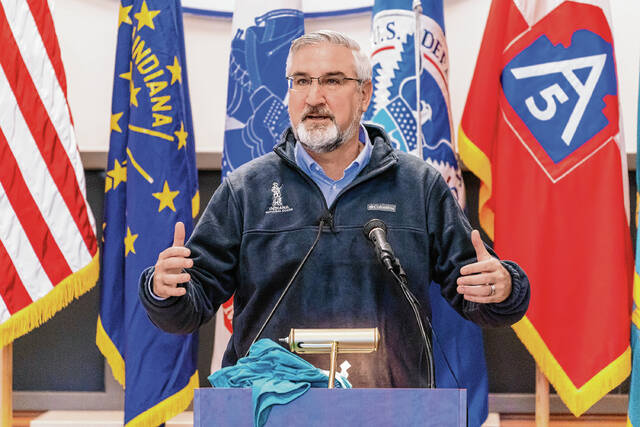
Gov. Eric Holcomb speaks on Tuesday during a press conference at Camp Atterbury in Edinburgh discussing progress on resettling Afghan refugees.
SCOTT ROBERSON | DAILY JOURNAL
By Emily Ketterer
Indianapolis Business Journal
INDIANAPOLIS — Indiana Gov. Eric Holcomb issued his first veto of this year’s legislative session on a bill that would have put some restrictions on state agency rulemaking procedures, the governor’s office announced Wednesday.
In his veto letter to legislative leaders, Holcomb wrote that his primary issue with House Bill 1211 came from unvetted language relating to broadband expansion that was inserted into the bill on the last day of the session during the conference committee process.
The bill would have required that all broadband infrastructure projects funded by state grants or loans would have to comply with the criteria in the state Next Level Connections Broadband Grant Program. Holcomb wrote that the language could unintentionally slow or arrest the approximately $154 million in broadband projects that are being funded by a different program, the Regional Economic Acceleration and Development Initiative, or READI, program. He said that would be “neither fair or appropriate” to potentially jeopardize those projects in 82 counties across the state.
That language was not found in other legislation that was considered prior to the last day of session, and it was inserted in HB 1211 without going through the proper legislative process in either the House or the Senate, which meant it was not properly vetted, Holcomb wrote. Outside stakeholders affected also did not have means to testify to lawmakers about the provision.
Also inserted into HB 1211 on the final day of session was language from House Bill 1100, which would have restricted state agencies’ new emergency rulemaking abilities. HB 1100 had died in the Senate after the chair of the Senate Commerce and Technology Committee declined to give the bill a hearing, claiming the legislation was not ready to be passed.
Holcomb was also critical of that legislative process in his veto letter. He said HB 1100 had little debate in the House, and he noted there was not an opportunity for public comment on it in the Senate before it died.
The language from HB 1100 added to 1211 would have required agencies to submit an emergency rule to the Indiana attorney general for review before it could take effect, and it would require an economic impact statement and explanation of any penalty associated with any proposed new rule to be submitted to state lawmakers. Agencies would also have to renew rules more often.
Holcomb went on to say that while he agrees with what the agency oversight language attempts to do, he has issue with the restrictions on rulemaking that could cause a delay in agencies’ abilities to act quickly in creating emergency rules. He said as an example, the state Board of Animal Health often has to act quickly in adopting emergency rules that could address health and safety concerns.
Holcomb said in the letter that while the legislative process is frustrating at times and some say its designed that way for a reason, “topics of such gravity like those highlighted in this letter always benefit from a full review and discussion.”
Lawmakers, who hold Republican supermajorities in the House and Senate, can override the governor’s veto with a simple majority vote in both chambers. They are scheduled to return to the Statehouse on May 24 to address any technical corrections or vetoes.
Holcomb so far has signed nearly 100 bills into law of the 177 that were sent to his desk from the 2022 legislative session. Bills that he doesn’t sign will still become law unless he vetoes them.




